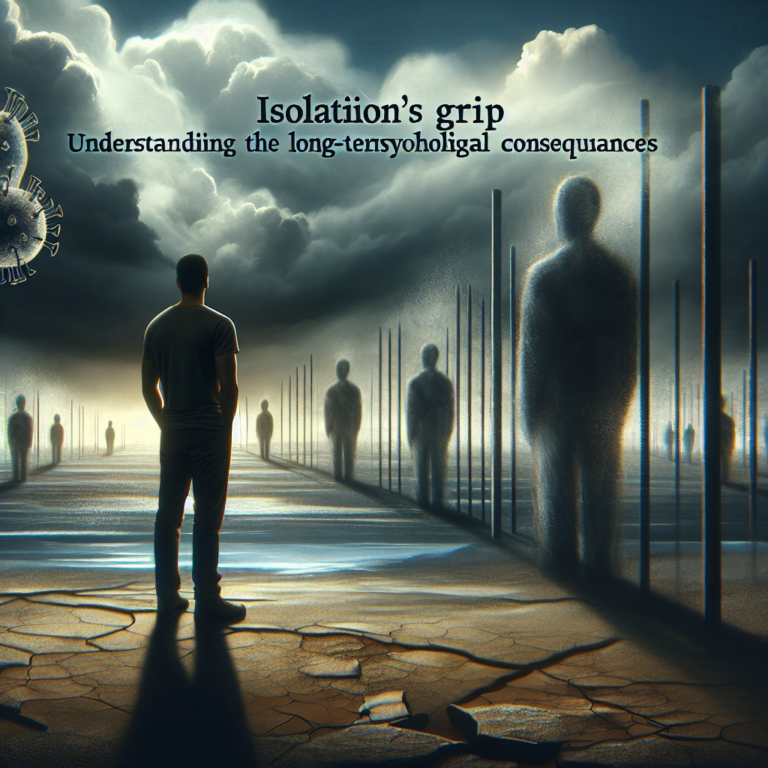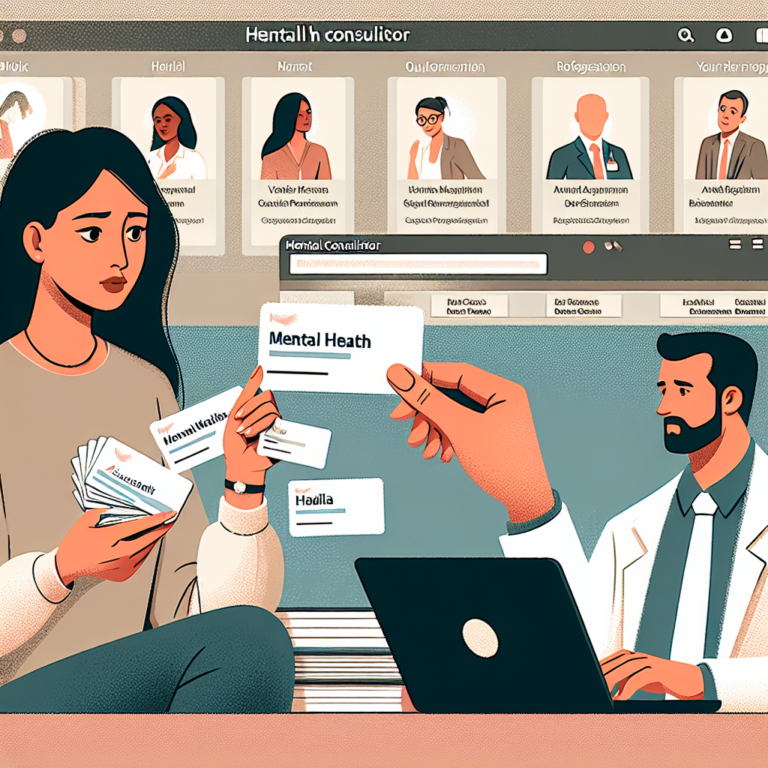
Empowerment through Awareness: Addressing the Mental Health Needs of Chronic Illness Patients
Introduction
Imagine waking up each day battling a relentless storm within your body, feeling as if the world is pushing against you while you struggle to maintain a semblance of normalcy. For individuals living with chronic illnesses, this scenario often becomes a daily reality. However, amidst this struggle, there exists a powerful antidote: empowerment through awareness. Understanding and addressing the mental health needs of chronic illness patients can lead to transformative changes in their lives.
In recent years, society has begun to recognize the intricate link between chronic physical conditions and mental health, highlighting the urgent need for comprehensive support that goes beyond traditional medical care. This article delves deep into the complexities of this relationship, illustrating how empowerment through awareness can serve as a vital tool for individuals grappling with chronic illness, their caregivers, and healthcare professionals alike. By equipping ourselves with knowledge and understanding, we can foster resilience, build supportive communities, and ultimately enhance the quality of life for those affected.
The Dynamics of Chronic Illness and Mental Health
Understanding Chronic Illness
Chronic illness encompasses a range of long-term health conditions, such as diabetes, arthritis, and autoimmune diseases. These conditions often come with persistent symptoms that can significantly alter one’s lifestyle and day-to-day functioning. Understanding the nature of chronic illness is the first step toward addressing the mental health needs of patients.
The Impact on Mental Health
Data shows that nearly 50% of individuals with chronic illnesses experience mental health disorders, including depression and anxiety. The constant struggle with symptoms can lead to feelings of helplessness and isolation. Moreover, societal stigma surrounding chronic illnesses often exacerbates these feelings, making patients reluctant to seek help.
| Condition | Percentage with Mental Health Issues |
|---|---|
| Chronic Pain | 65% |
| Diabetes | 50% |
| Autoimmune Diseases | 45% |
It is essential to recognize that the relationship between chronic illness and mental health is not merely a co-occurrence but rather an intricate interplay that demands attention and intervention.
Empowerment Through Education
The Role of Awareness
Awareness sets the foundation for empowerment. As patients gain a clearer understanding of their conditions, they can make informed choices regarding their health management. Educational initiatives tailored towards chronic illness patients can improve self-efficacy, providing them with tools to navigate their health journeys.
Case Study: The Diabetes Self-Management Program (DSMP)
In a notable case, the Diabetes Self-Management Program (DSMP) has demonstrated the effectiveness of education in managing diabetes-related mental health issues. This program emphasizes skills development, goal-setting, and problem-solving, allowing participants to feel more in control of their condition. Results indicated a significant reduction in depressive symptoms among participants, showcasing the powerful impact that awareness and education can have on mental well-being.
Defining Treatment and Self-Management Strategies
For many chronic illness patients, understanding treatment modalities and self-management strategies can be empowering. Whether it involves learning about medication management, diet adaptations, or stress-reduction techniques, a well-informed patient is a confident patient.
Empowerment through Awareness: Addressing the Mental Health Needs of Chronic Illness Patients begins with self-education. Online platforms, workshops, and support groups can serve as valuable resources for patients and caregivers alike.
Building Supportive Networks
The Importance of Community
Chronic illness can be an isolating experience, but connection can foster empowerment. Creating supportive networks of peers, caregivers, and healthcare providers can provide a lifeline for many individuals. Support groups not only offer a safe space for sharing experiences but also highlight collective wisdom that encourages coping strategies and resilience.
The Role of Technology
In the digital age, technology facilitates connection. Online forums, social media groups, and telehealth platforms have emerged as vital tools for individuals seeking support. These communities can empower patients through shared experiences and resources.
Case Study: Online Support Group Interventions
Research into online support group interventions for rheumatoid arthritis patients revealed a remarkable reduction in depression and anxiety levels. Participants reported feeling less isolated and more connected to others navigating similar challenges. They shared tips, encouragement, and even tips on managing their illness effectively, proving the power of communication in mental health support.
Integrating Family and Caregivers
Caregivers play a pivotal role in supporting chronic illness patients. By educating family members about the mental health aspects tied to the patient’s condition, they can become advocates for their loved ones, offering much-needed emotional support and understanding.
Professional Support and Resources
Engaging Mental Health Professionals
Mental health care is an integral component of managing chronic illnesses. Psychotherapy, counseling, and cognitive-behavioral therapy (CBT) are approaches that can help patients navigate the emotional challenges associated with their conditions.
Bridging the Gap
Many healthcare providers are increasingly recognizing the importance of addressing mental health needs alongside chronic illness treatment. Integrating mental health professionals into primary care can offer a holistic approach to patient wellness.
Case Study: Collaborative Care Models
In a recent study involving patients with multiple chronic conditions, a collaborative care model that integrated mental health services yielded improved patient outcomes. Patients reported higher satisfaction levels and a notable decrease in mental health symptoms when their care team included mental health professionals.
Accessibility to Resources
Addressing logistical barriers, such as cost and availability of mental health services, is crucial. Policymakers and healthcare systems must work together to ensure that mental health care is accessible to all chronic illness patients.
The Power of Personal Narratives
Storytelling as a Tool for Empowerment
Personal narratives, shared by chronic illness patients, serve to humanize their experiences and underscore the complexities of managing both physical and mental health. These stories can inspire hope and provide insight into effective coping strategies.
Case Study: The Invisible Illness Awareness Campaign
The Invisible Illness Awareness Campaign has successfully utilized storytelling as a means of raising awareness about the mental health challenges faced by those with chronic conditions. By sharing authentic stories, the campaign fosters a sense of community, empowering individuals to share their experiences and advocate for their needs.
Cultivating Resilience
Resilience is a skill that can be nurtured. Encouraging chronic illness patients to share their stories not only helps them process their experiences but also empowers others to seek help when needed.
Mindfulness and Mental Wellness
The Role of Mindfulness
Mindfulness practices, including meditation, yoga, and breathing exercises, can provide a calming refuge for individuals with chronic illnesses. These techniques can reduce feelings of anxiety and depression, enhancing overall mental well-being.
Integrating Mindfulness into Daily Life
Integrating mindfulness into daily routines encourages patients to reconnect with their bodies and minds. Simple exercises, like mindful breathing or gratitude journaling, can foster a greater sense of control over their emotional landscapes.
Case Study: Mindfulness-Based Interventions
Research on mindfulness-based interventions for patients with chronic pain conditions revealed significant decreases in perceived pain levels and improved mental health outcomes. Participants reported feeling empowered to manage their symptoms through mindfulness techniques, reinforcing the notion that awareness and practice can enhance overall quality of life.
Conclusion
The journey of living with a chronic illness is fraught with challenges, yet it is precisely these challenges that can lead to profound growth and empowerment. Empowerment through Awareness: Addressing the Mental Health Needs of Chronic Illness Patients is not merely a concept but a vital approach to transforming our understanding and treatment of chronic illnesses.
By championing education, fostering community support, and integrating mental health care, we can enhance the resilience and quality of life for individuals affected by chronic conditions. The road may be difficult, but with the right tools and support, empowerment is within reach. Let us work together to create a world where chronic illness patients feel understood, supported, and empowered.
FAQs
What is the connection between chronic illness and mental health?
Chronic illness can lead to increased feelings of anxiety, depression, and isolation, making it essential to address mental health needs alongside physical health.How can I support a loved one with a chronic illness?
Offer emotional support, educate yourself about their condition, and encourage them to seek professional help as needed.What resources are available for managing mental health in chronic illness?
Therapy, support groups, mindfulness practices, and educational workshops are excellent resources for managing mental health challenges.Is it common for chronic illness patients to experience depression?
Yes, studies indicate a significant percentage of chronic illness patients also experience mental health disorders, including depression.- How can mindfulness help chronic illness patients?
Mindfulness practices can help reduce anxiety, improve emotional well-being, and enhance one’s ability to cope with symptoms.
By equipping ourselves with knowledge and fostering supportive environments, we can collectively uplift the voices of those living with chronic illnesses. Empowerment through awareness is not just a goal; it is a journey we must undertake together.

















